Fine Gael
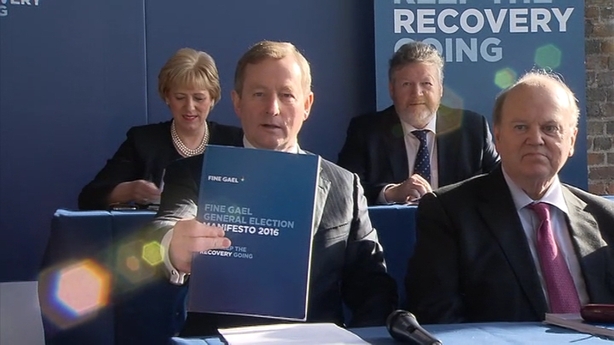
Taoiseach Enda Kenny launched the Fine Gael manifesto with the promise of 200,000 jobs, the abolition of the USC and a €20 increase in weekly social welfare payments to carers, the disabled and the sick.
It also proposes a €25 a week increase in the old-age pension.
The party proposes an additional 10,000 frontline public service workers and an increase in the minimum wage to €10.50 per hour.
Mr Kenny said there will be more doctors, gardaí and teachers under its plan.
Fine Gael also wants to extend free GP care to all children and introduce a second free pre-school year.
In relation to Fine Gael's tax plans it reiterates its proposal to abolish USC, but there will be a 5% clawback for those earning over €100,000.
It will reduce the entry point for PRSI to €13,000, while there will be a restoration of dental benefits.
The party is also planning a €4bn fund for investment in jobs.
Fianna Fáil
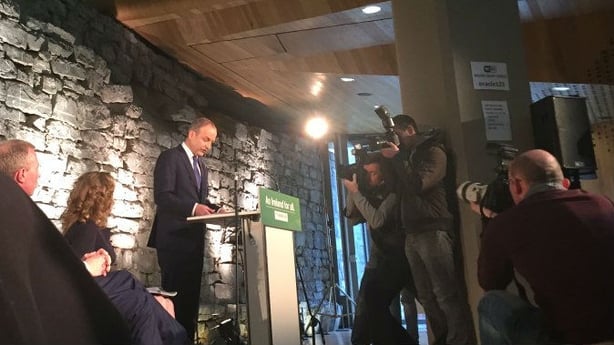
Fianna Fáil has promised to create 250,000 jobs and to eliminate the Universal Social Charge for workers earning up to €80,000.
At the launch of the Fianna Fáil manifesto, party leader Michéal Martin said that, in government, his party would increase the old age pension by €30 a week and child benefit by €10 a month.
The party is also proposing to increase garda numbers to 15,000.
It promises to recruit 4,000 more nurses, bring in a six-hour waiting time limit in hospital emergency departments, abolish prescription charges and bring in a first-time buyers' grant.
Mr Martin also stated that Fianna Fáil would provide an alternative to Irish Water and suspend water charges for five years.
On repealing the Eighth Amendment, Mr Martin said he was open to examining the issue, and had already said his party would have a free vote if it came to it.
Sinn Féin
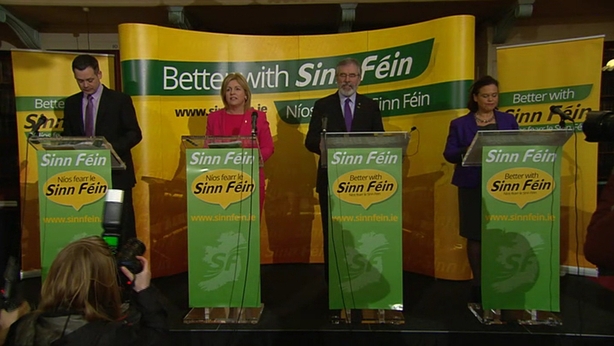
Sinn Féin leader Gerry Adams has pledged that, in government, his party would create 250,000 jobs, abolish water charges and the property tax.
The party says in its manifesto that it would also take nearly 300,000 citizens out of the Universal Social Charge net, with those earning below €19,500 exempt.
Sinn Féin would also introduce an additional 7% tax on income over €100,000.
The party says it plans to move from the two-tier, public-private system to a universal health service, free at the point of delivery to all. It has earmarked €3.3 billion for health and plans to recruit 6,600 frontline staff.
On the homelessness crisis, Mr Adams said Sinn Féin is committed to building 100,000 social and affordable homes and to guaranteeing rent certainty.
Sinn Féin deputy leader Mary Lou McDonald pledged that the party would prioritise safety by recruiting 3,000 additional gardaí to restore An Garda Síochána force levels to 14,250.
Labour
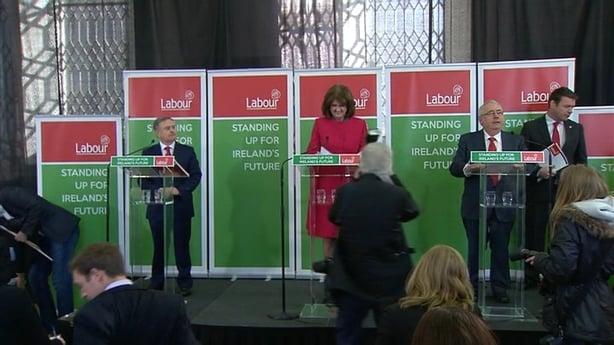
Labour used its manifesto to promise a job for everyone who wants one by 2018 and increases in the minimum wage and pension.
The manifesto also promises a referendum on repealing the Eighth Amendment if Labour is in government after the election.
It promises to raise the minimum wage to €11.30 and a hike in the pension to €260.
Free GP care for all, smaller class sizes, extending parental leave and capping childcare costs are also in Labour’s plans.
The party had already flagged many of its proposals, including the abolition of USC for those earning up to €72,000.
Labour said its manifesto is "based on an optimistic view of the future" and has "continued investment in education as its heart".
People Before Profit
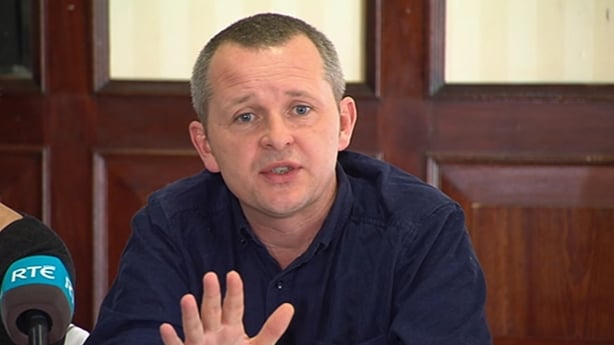
At the launch of the People Before Profit manifesto, party leader Richard Boyd Barrett said: "We are proposing a progressive taxation system that will tax those earning over €100,000 on a sliding scale basis."
Mr Boyd Barrett also said that People Before Profit would introduce a "Robin Hood Tax" on financial transactions.
He said that People Before Profit will make corporations pay a corporate tax rate of 12.5%. The party estimates that €3.5bn would be raised per year if the 12% corporation tax was increased.
He said the party’s costings on corporation tax and a wealth tax were based on Revenue statistics.
The party’s manifesto prioritises the removal of the USC for those on incomes below €70,000. It also wants to see the abolition of property tax on the primary family residence and the abolition of water charges.
Social Democrats
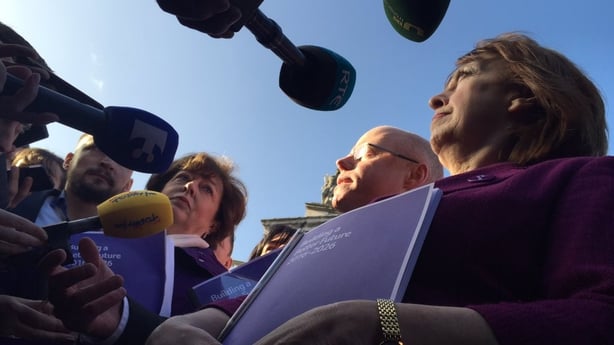
The Social Democrats manifesto accuses Fine Gael and Labour of pledging to erode the tax base by eliminating the USC, saying that the party would maintain the current tax base, using the revenue to create a modern healthcare system, improve infrastructure, and support affordable childcare.
The party says that rather than cut taxes it would reduce the cost of living through measures including introducing affordable childcare, reducing third-level fees, prescription charges and public transport fares, abolishing water charges, and linking rent increases to the cost of living.
The Social Democrats also want to create a community banking sector, with further services at credit unions and post officers, including full current accounts and online banking.
The party pledges to tackle the housing crisis, including creating a new Ministry with specific responsibility for housing.
Renua
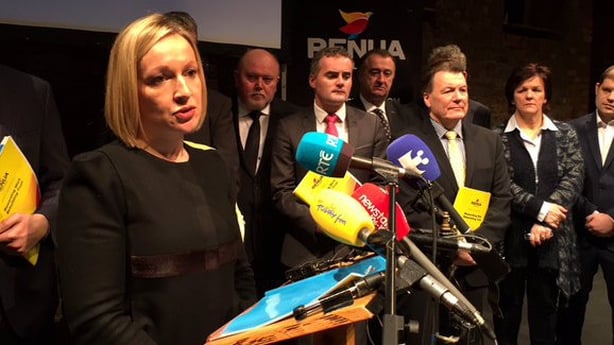
The headline item in Renua Ireland’s manifesto is a flat tax rate of 23%, with a system of graduated payments to those earning less than €70,000.
Renua says the current system discriminates against the self-employed, and in government, it would immediately replicate the tax credits available to PAYE workers. This would be an interim measure until the flat tax was implemented.
The party also pledges tax cuts for those who cannot afford childcare, and commits to a €1bn investment in a network of crèches.
Renua says it would abolish motor tax and replace it with a fuel levy.
It says it would reform local government, with directly-elected mayors in every council area.
Green Party
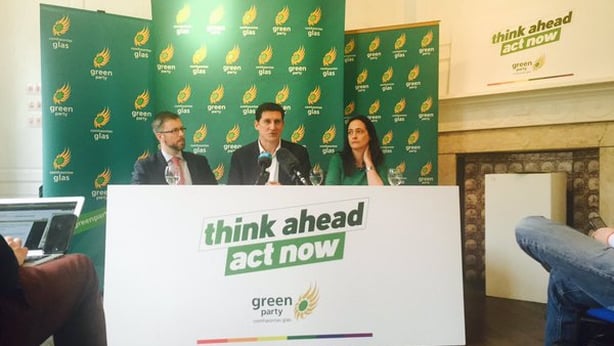 The Green Party manifesto prioritises investment in infrastructure, young people and community development.
The Green Party manifesto prioritises investment in infrastructure, young people and community development.
The manifesto proposes an extra €1.1bn increase in budget spending annually over and above existing commitments.
The Greens argue that application of more transparent rules to multinationals could deliver about €1.5bn in additional revenue over the lifetime of the next government.
It is proposing holding a referendum to enshrine housing as a social right in the Constitution, converting State lands for social use and establishing a national housing authority.
It also wants a referendum to copper-fasten the public ownership of water and a total overhaul of the utility Irish Water.
The party envisages a fossil fuel free economy by 2050 after what it says will be a massive investment in national energy policy.
There would be an investment of €1.6bn over the lifetime of the government in promoting public transport and cycling.

